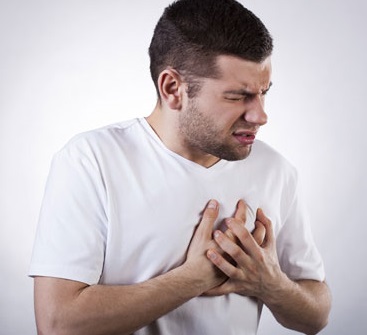 Trapped wind in chest can be a painful condition. People often mistake this for a heart attack or abdominal pain. If you do have chest pain, it is important to have a medical evaluation to rule out a heart problem or other condition. If your doctor gives you the all clear, understand that gas pain is a very common condition.
Trapped wind in chest can be a painful condition. People often mistake this for a heart attack or abdominal pain. If you do have chest pain, it is important to have a medical evaluation to rule out a heart problem or other condition. If your doctor gives you the all clear, understand that gas pain is a very common condition.
We all suffer from trapped gas at some time in our lives. Most of the time, we pass flatus or belch and it goes away. If it isn’t relieved, it is possible to suffer from gas pains in chest. The cause is usually drinking or eating and may even lead to gas build up in the intestines. The result is usually diarrhea or constipation accompanied by abdominal cramping.
What Causes Trapped Wind in Chest?
1. Swallowing Air
Swallowing too much air when you eat or drink can cause gas buildup in the chest area. This can be caused by eating or drinking too fast, smoking, gum chewing and nausea. If you do not belch up the excess air it can become trapped.
2. Hernia
A hiatal hernia can cause air to be trapped in the stomach. They happen when part of the esophagus pushes its way through the diaphragm. They cause more belching and can even cause pains in the chest area.
3. Gallbladder
Pain in the gallbladder is caused by stones. The gallbladder is part of your digestive system that releases bile to help break down food. Gallstones are usually very small and don’t require treatment. When they grow large, the gallbladder may need to be removed. A gallbladder “attack” can cause abdominal pain, chest pain or pain in the right shoulder.
Note: Gallbladder surgery is often performed via laparoscope. This type of surgery requires carbon dioxide to inflate your stomach. The carbon dioxide can remain in the chest for several days after surgery and cause trapped gas in chest and be painful.
4. GERD (Gastroesophageal Reflux Disease)
GERD can cause chest pain that may be mistaken for gas pains in chest. This is actually stomach acids and contents that come back up after eating. Often foods that cause GERD can also cause trapped gas and add to the pain.
5. Anxiety
If you are overly anxious, you may get trapped wind in chest. Many people suffering from anxiety gulp air during a panic attack. During periods of stress the digestive functions may slow down and cause gas buildup.
6. Dietary Causes
There are many foods that can cause gas and gas pains in chest. This includes bacteria due to undigested carbohydrates, too much fiber, too many beans, whole grains, and carbonated drinks. Gas may also be a sign of a food allergy or intolerance.
How to Get Rid of Trapped Wind
If you have chest pain for the first time and are not sure it may be gas pains, it could be a medical emergency and you should be evaluated right away. If you have been told you have gas pains in chest, these things may help bring relief:
1. Get Moving
Walking helps get the digestive system moving and can move air through. Try taking a walk after dinner every evening. If you have recently had surgery, you need to get moving to help your bowels wake up from anesthesia. This will help prevent trapped gas and constipation.
2. Increase Fluids
Drinking more fluids can help move food through the digestive system and prevent bacteria formation that causes gas. Fluids will also help you pass gas. Drinking warm liquids are even more effective for gas relief.
3. Lie on Your Back
Lie flat on your back and elevate your head and shoulders. While doing this, raise your knees to your chest and then back to the floor with your knees bent and feet flat on floor. Do this while breathing in and out 10 times. When sleeping, lie on your left side.
4. Avoid Soda
Avoid any drinks with carbonation. Carbonated drinks can cause trapped wind in chest that gets worse with repeated intake of sodas. If you do drink soda, make sure that you belch up any gas that is in your stomach before it gets pushed down into your intestines.
5. Try a Home Remedy
There are certain things that relieve gas right in your own kitchen. You can try eating mustard on your food, a natural substance that relieves gas. Other things include cumin, turmeric, and cardamom. Baking soda and charcoal capsules can help relieve gas build-up. You can also take a tablespoon of apple cider vinegar, but if it loosens your bowel decrease to two teaspoons.
6. Ginger
Ginger has long been used as a natural digestive remedy and helps everything from upset stomach to gas pains. You can make a weak tea from fresh ginger or use ginger capsules if you don’t like the taste.
7. Reduce Intake of Dairy
If you cannot tolerate lactose you will find that gas builds up quickly in your system. Eating dairy such as yogurt, cheese, milk can cause your stomach to bloat and feel uncomfortable. If the gas isn’t relieved it can travel up into your chest and be painful. You can also use an over-the-counter enzyme to help you break down the lactose and avoid this problem.
8. Get Checked for Gluten Intolerance
If you have gluten sensitivity, then eating gluten may be causing your problem with gas. If you are found to be gluten intolerant, you may benefit from cutting gluten from your diet. However, cutting gluten without an intolerance may rob you of much needed nutrients and isn’t always recommended.
